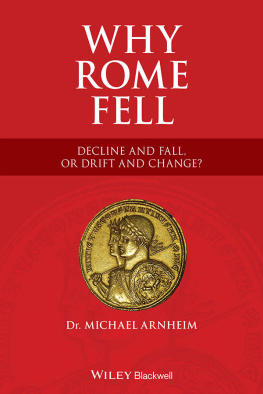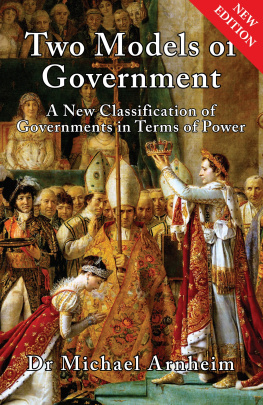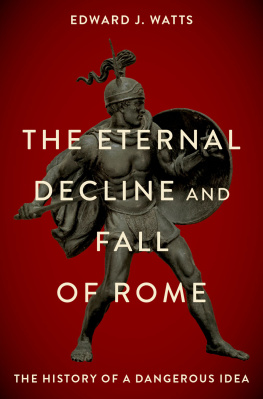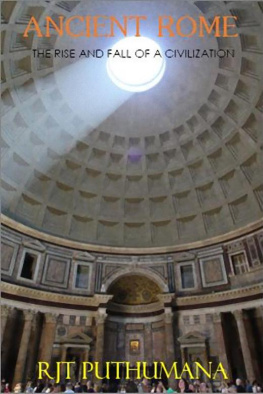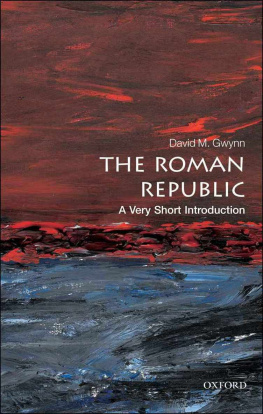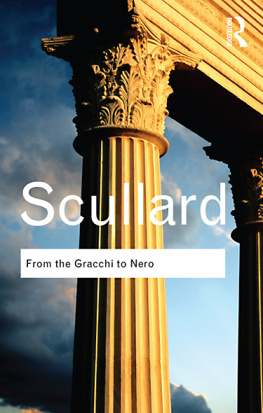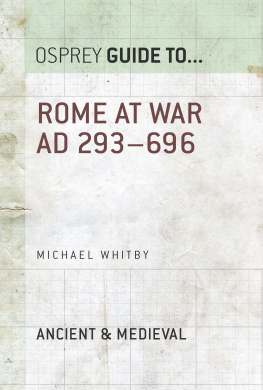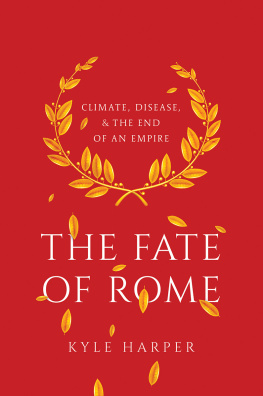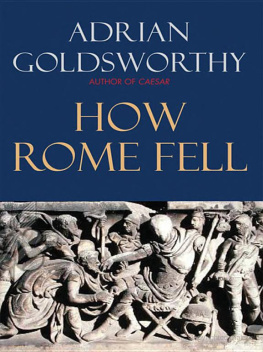
Glossary
MonarchyRule by one person, or a state under such rule. From the Greek
monos(alone) +
archein(to rule). In this book, the term is not used of largely nominal monarchies, like those of contemporary western Europe and the United Kingdom, which are really oligarchies in disguise. See .AristocracyRule by a hereditary elite, a hereditary oligarchy; also, the members of such an elite. From the Greek
aristos(best) +
kratos(power or rule), so, literally rule of the best. See .OligarchyRule by a non-hereditary elite; also, the members of such an elite. From the Greek
oligoi(the few) +
archein(to rule). See .Noble, nobilityIn this book, the terms
nobleand
nobility(in Latin,
nobilisand
nobilitas, respectively) are used to refer to any member of the senatorial aristocracy by birth or origin, or, in other words, those born with the hereditary rank of
clarissimus---as against those who became
viri clarissimiby virtue of holding a particular office. This usage contrasts with the stricter Republican convention under which the designation of
noblewas reserved to descendants of a consul.EliteA privileged minority, whether based on birth, wealth, race, or religion, and whether or not exercising dominant political power. A French term,
lite, deriving from Latin
electus(chosen or selected). See .HeresyIn reference to Christianity, any deviant belief condemned and anathematized by a dominant Christian denomination. In particular, any deviant belief condemned and anathematized by a church council recognized by the Catholic Church, or, in the Byzantine Empire, any belief at variance with and condemned by the Orthodox Church. Examples of heresies include Arianism, Nestorianism, and Monophysitism. An adherent of a heresy is known as a heretic. In this book, these terms, and also
heresiology,are always encased in quotation marks to indicate that the author does not accept, endorse or condemn beliefs on either side of these religious disputes. See .Holy manIn this book, this term is always encased in quotation marks to indicate that the characterization of individuals so described is tendentious. See .Pagan, paganismThe adherent of any religion other than Judaism, Christianity, or Islam, first used as a pejorative term by Christians in the fourth century CE. Because of its negative connotations, it is sometimes now replaced by polytheist and polytheism, referring, literally, to the worship of many gods, as distinct from the monotheism of Judaism, Christianity, and Islam. However, polytheism is hardly less pejorative than pagan, and not all pagans worshiped multiple gods in any case. So, in this book, pagan and paganism continue to be used, but without any negative connotations. See .BarbariansThe English word
barbariancomes from Greek
barbaros, via Latin
barbarus, a pejorative term used by the Romans to refer to anyone who was neither Greek nor Roman, and whose unintelligible speech sounded to the Romans like a babble of
bar-bar-bar-bar.
Barbarians,in quotation marks, is used in this book instead of Germanic tribes, in deference to the ongoing debate among historians about whether peoples such as the Goths, the Vandals, and the Franks can be regarded as sharing an overarching Germanic identity. My own view is that there was a common bond, though there clearly were some non-Germanic barbarians, notably the Huns and the Alans. Accordingly, the term barbarians is used in this book without any pejorative connotations. See .
Note: Except where otherwise indicated, all years referred to in this book are CE (Common Era) dates, equivalent to AD (Anno Domini), as distinct from BCE (Before the Common Era), or BC, dates.
Primary Sources and Abbreviations
Note: This list contains only the most frequently cited primary sources
Translations : Where primary sources are quoted in translation, the translations are by myself unless otherwise indicated by tr. followed by the name of the translator.
Bible : Unless otherwise indicated, biblical citations are from the King James Version, which is in the public domain in the United States.
Inscriptions : Inscriptions referred to by just a number are from CIL.
Papyri : Papyri are referred to in the text with an initial P. E,g, P. Oxyrhynchus.
| AE | Anne pigraphique |
| Amb. Ep. | Ambrose, Epistulae |
| Amm. | Ammianus Marcellinus, tr. John C. Rolfe (Loeb Classical Library), 1989 |
| Anon. Val. | Anonymus Valesianus |
| Apuleius | Apuleius, Metamorphoses (The Golden Ass), tr. P.G. Walsh (Oxford Worlds Classics), 2008 |
| Aug. Civ. Dei | Augustine, De Civitate Dei (The City of God), tr. R.W. Dyson (Cambridge Texts in the History of Political Thought), 1998 |
| Aug. R.G. | Augustus, Res Gestae Divi Augusti |
| Aur. Victor | Aurelius Victor, Liber de Caesaribus |
| Ausonius | Mosella, Ephemeris, Epigrammata, Caesares |
| Boethius, Consol. | Boethius, De Philosophiae Consolatione |
| Cassiodorus | Cassiodorus, Variae Epistolae |
| Cassius Dio | Cassius Dio, Historia Romana (Roman History), tr. Earnest Cary (Loeb Classical Library), 1989 |
| Cic. Ad Fam. | Cicero, Epistulae ad Famiiares |
| Cic. Pro Sestio | Cicero, Pro Sestio |
| Cic. De Nat Deorum | Cicero, De Natura Deorum |
| CIL | Corpus Inscriptionum Latinarum |
| CJ | Codex Justinianus (Justinians Code) |
| Claudian | Claudius Claudianus, De Consulatu Stilichonis |
| CTh | Codex Theodosianus (Theodosian Code), Tr. Clyde Pharr, 1952 |
| Dig. | Justinian, Digest (Pandects) |
| Epit. Caes. | Epitome de Caesaribus |
| Eus. HE | Eusebius, Historia Ecclesiastica |
| Eus. VConst. | Eusebius, De Vita Constantini |
| Eutrop. | Eutropius, Breviarium |
| Evagrius | Evagrius Scholasticus, Historia Ecclesiastica |
| Gregory of Tours | Gregorius Turonensis, Historia Francorum |
| Hor. Od. | Horace, Odes |
| ILS | Inscriptiones Latinae Selectae, ed. H. Dessau |
| Jerome | Hieronymus, Commentaria in Ezechielem |
| Jerome, Ep. | Hieronymus, Epistulae |
| Joh. Eph. | John of Ephesus, Historia Ecclesiastica |
| Jordanes, Get. | Jordanes, Getica |
| Julian, Caes. | Julian, De Caesaribus |
| Julian, Ep. | Julian, Epistulae |
| Julian, Mis. | Julian, Misopogon |
| Juv. | Decimus Junius Juvenalis, Satires |
| Lactantius, Mort. Pers. | Lactantius, De Mortibus Prsecutorum |
| Libanius, Ep. | Libanius, Epistulae |
| Libanius, Or. | Libanius, Orationes |
| Livy | Titus Livius, Ab Urbe Condita (History of Rome), Tr. B.O. Foster, 1989 (Loeb Classical Library) |
Next page
